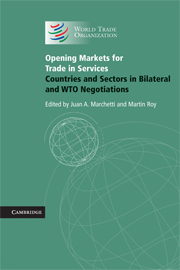Book contents
- Frontmatter
- Contents
- List of figures
- List of tables
- List of boxes
- List of contributors
- Foreword
- Acknowledgments
- Disclaimer
- Summary and overview
- PART I From Policy to Negotiations
- PART II Multilateral and Bilateral Negotiations on Services: Overall Perspectives
- PART III Challenges, Issues and Opportunities in Services Sectors
- PART IV Country Experiences with Services Trade
- 14 GATS plus or minus? Services commitments in comparative contexts for Colombia and Uruguay
- 15 Opening services markets at the regional level under the CAFTA-DR: the cases of Costa Rica and the Dominican Republic
- 16 Why isn't South Africa more proactive in international services negotiations?
- 17 Services liberalization in PTAs and the WTO: the experiences of India and Singapore
- 18 The domestic dynamics of preferential services liberalization: the experience of Australia and Thailand
- 19 The Chilean experience in services negotiations
- Appendix: A reader's guide to basic GATS concepts and negotiations
- Index
- References
14 - GATS plus or minus? Services commitments in comparative contexts for Colombia and Uruguay
Published online by Cambridge University Press: 05 December 2011
- Frontmatter
- Contents
- List of figures
- List of tables
- List of boxes
- List of contributors
- Foreword
- Acknowledgments
- Disclaimer
- Summary and overview
- PART I From Policy to Negotiations
- PART II Multilateral and Bilateral Negotiations on Services: Overall Perspectives
- PART III Challenges, Issues and Opportunities in Services Sectors
- PART IV Country Experiences with Services Trade
- 14 GATS plus or minus? Services commitments in comparative contexts for Colombia and Uruguay
- 15 Opening services markets at the regional level under the CAFTA-DR: the cases of Costa Rica and the Dominican Republic
- 16 Why isn't South Africa more proactive in international services negotiations?
- 17 Services liberalization in PTAs and the WTO: the experiences of India and Singapore
- 18 The domestic dynamics of preferential services liberalization: the experience of Australia and Thailand
- 19 The Chilean experience in services negotiations
- Appendix: A reader's guide to basic GATS concepts and negotiations
- Index
- References
Summary
The increasing proliferation of bilateral, regional, and multilateral trade agreements has put new twists and brought new questions to the fore in the old debate on the effects of these agreements (either separately or together) on the concerned economies, as well as on world trade as a whole. By July 2007 nearly 380 preferential trade agreements had been notified to the WTO, and it is estimated that over 400 PTAs will be in force by 2010. Earlier the chief concern had been whether regional or bilateral agreements were building blocks or stumbling blocks toward multilateralism; this became an issue, empirically for a while, centering on how the two types of agreements had to exist “side by side,” for better or for worse (Fisch, 2001). As one Colombian negotiator put it: “The WTO is not a place of liberalization, but consolidation”. The concern is now revisited in the context of a possible breakdown or slowing down of the multilateral order itself, and the increasing pressure on small economies to meet the demands of the great powers in bilateral free trade agreements in defecting from both regional and multilateral trade arrangements. This chapter attends to the latter set of concerns in speaking of the GATS+-type arrangements becoming de rigueur in bilateral agreements. In doing so, however, it also showcases trade as an increasingly complex set of arrangements between local, national, regional, and international dynamics.
- Type
- Chapter
- Information
- Opening Markets for Trade in ServicesCountries and Sectors in Bilateral and WTO Negotiations, pp. 505 - 536Publisher: Cambridge University PressPrint publication year: 2009



